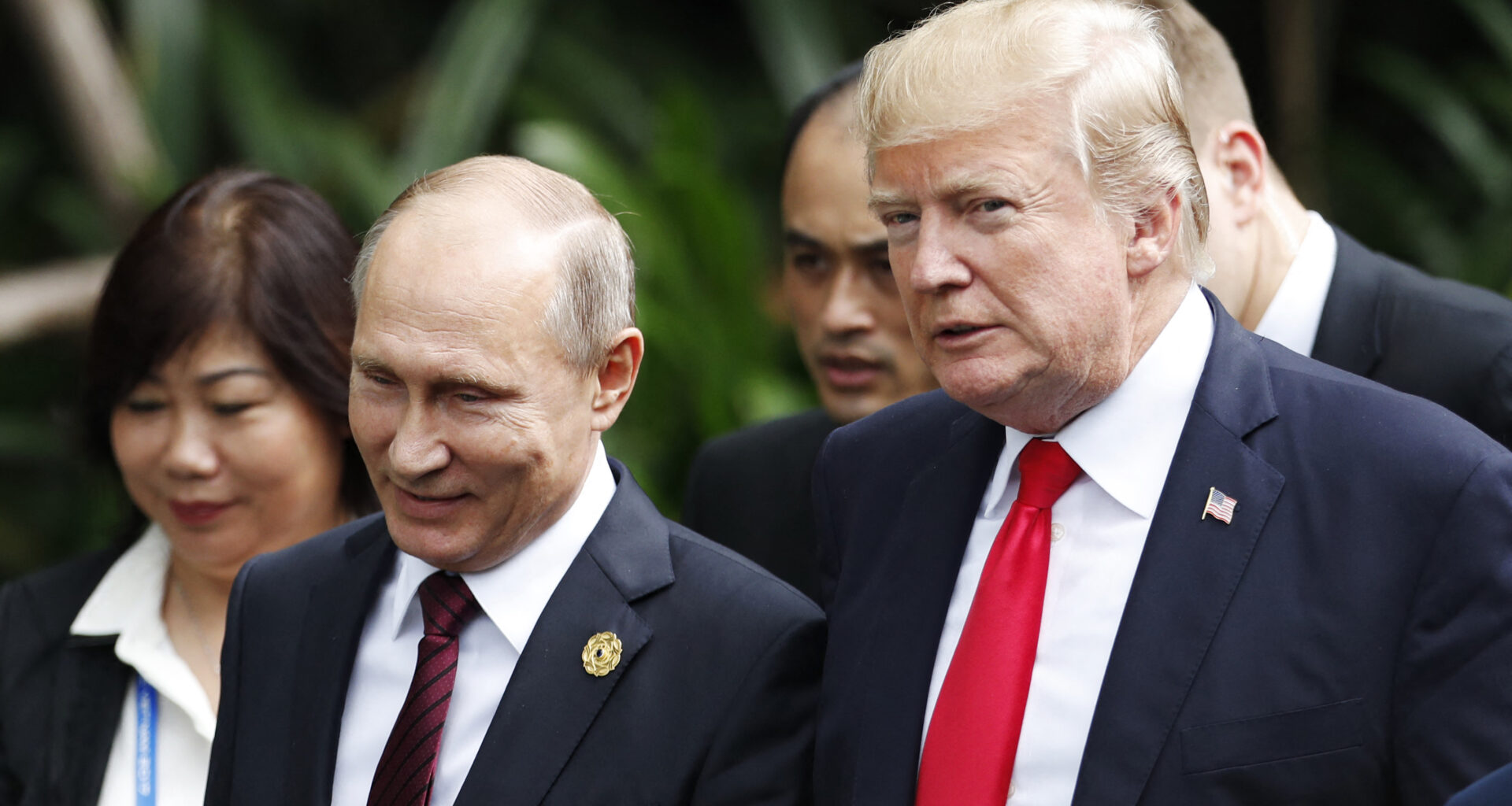Russia has claimed that unnamed nations are orchestrating “titanic efforts” to disrupt the planned summit between U.S. President Donald Trump and Russian President Vladimir Putin set for August 15 in Alaska.
Newsweek contacted the White House and NATO for comment via online forms on Sunday.
Why It Matters
The announcement of the meeting, a potential turning point in the Russia–Ukraine conflict, has heightened tensions. The stakes are significant, with implications for European security and the ongoing war.
Kirill Dmitriev, Russia‘s investment envoy, alleged that certain unnamed countries are working to prolong the war, deploying disinformation and provocations to prevent progress toward a ceasefire or peace deal.

U.S. President Donald Trump, right, and Russia’s President Vladimir Putin in the Vietnamese city of Danang on November 11, 2017.
U.S. President Donald Trump, right, and Russia’s President Vladimir Putin in the Vietnamese city of Danang on November 11, 2017.
JORGE SILVA / POOL / AFP/Getty Images
What To Know
Trump previously claimed that Russia and Ukraine were nearing a ceasefire agreement that could end the three-and-a-half-year conflict. While details of the deal have not been disclosed, it may involve Ukraine ceding substantial territory, a prospect opposed by many European nations.
Dmitriev publicly accused undisclosed states of seeking to sabotage the summit with misinformation and destabilizing actions.
“Undoubtedly, a number of countries interested in continuing the conflict will make titanic efforts to disrupt the planned meeting between President Putin and President Trump,” Dmitriev said in a post in his Telegram account on Saturday, specifying that by efforts he meant “provocations and disinformation,” Reuters reported, although he did not elaborate further.
The Kremlin confirmed that Trump and Putin will meet in Alaska to pursue a long-term resolution to the conflict, though both sides expect the process to be fraught. It will be the first time Putin has set foot in the U.S. for 20 years.
Putin aide Yuri Ushakov, as reported by Reuters, said the two leaders will “focus on exploring ways to secure a long-term peaceful resolution to the Ukrainian crisis.” He acknowledged that “this will clearly be a difficult process,” but stressed that Russia intends to pursue it “actively and energetically.”
European leaders are voicing deep concern and have rallied behind Ukraine prior to the meeting, as per The Associated Press. They insist that any effective peace process must involve Ukraine and respect its territorial integrity. A coalition of EU countries emphasized that no deal should be forged at Kyiv’s expense.
Ukrainian President Volodymyr Zelensky has also rejected proposals involving land concessions, deeming any peace deal excluding Ukraine “stillborn” and “unworkable,” Indian newspaper The Economic Times reported.
What People Are Saying
As reported by Newsweek: President Donald Trump told reporters on Friday: “There will be some swapping of territories to the betterment of both.”
Ukrainian President Volodymyr Zelensky said: “We will not reward Russia for what it has perpetrated…The answer to the Ukrainian territorial question already is in the Constitution of Ukraine. No one will deviate from this—and no one will be able to. Ukrainians will not gift their land to the occupier.”
U.K. Defense Secretary John Healey told reporters at NATO headquarters, as per Defense News: “There can be no negotiation about Ukraine without Ukraine. And Ukraine’s voice must be at the heart of any talks.”
NATO Secretary-General Mark Rutte to ABC News: “Next Friday will be important because it will be about testing Putin, how serious he is on bringing this terrible war to an end.
“It will be, of course, about security guarantees, but also about the absolute need to acknowledge that Ukraine decides on its own future, that Ukraine has to be a sovereign nation, deciding on its own geopolitical future,”
Oleh Shamshur, senior fellow at the Eurasia Center at the Atlantic Council told Newsweek: “Concessions to Putin would be a prelude to new Russian aggression, which will be not limited to Ukraine and may target [NATO] Article 5 territory.”
Article 5 of the North Atlantic Treaty specifies that an attack on any NATO territory is considered an attack on all members of the alliance, triggering a collective response.
Yuriy Boyechko, founder of the charity Hope for Ukraine, told Newsweek: “Both Ukraine and their European partners must be a part of these talks between Trump and Putin, otherwise there is no way for lasting peace on the European continent.”
What Happens Next
The summit is poised to be a high-stakes negotiation over the direction of the Ukraine conflict, amid swirling distrust and warning from European and Kyiv officials. With allegations of sabotage now surfacing, the likelihood of geopolitical friction—even before the leaders meet—could further increase.
